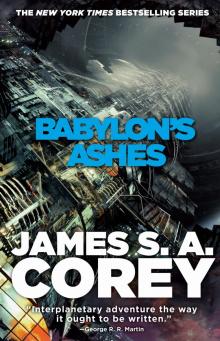- Home
- James S. A. Corey
Auberon Page 2
Auberon Read online
Page 2
“Ready?” she asked.
Are you ready to take control of a planet? Are you ready to command the lives of millions of people and forge the most valuable planet in the greater human sphere into a tool that will, in time, feed trillions of people under a thousand different suns? He told himself that the flutter he felt in his stomach was excitement. Not fear. Never dismay.
If she had been anyone else in all of humanity, he would have said Yes, I am. But it was Mona, and so his true feelings were safe.
“I don’t know.”
She kissed him, and the softness of her lips and the strength of them were a comfort and a promise. He felt his body starting to react to her and stepped back. Distracted and aroused was no way to start his tenure as governor. The millimeter lift of her eyebrows meant she understood everything he hadn’t said.
“I’m just going over to my cabin tochange,” she said.
“That sounds wise.”
She took his hand, squeezed it. “We’re going to be fine,” she said.
Less than an hour later, he walked down the gantry and stepped for the first time onto the planet. His planet.
From sunrise to sunset lasted a little over four standard hours on Auberon, with cycles of light and darkness changing only slightly with the seasons. By local convention, day was two cycles of light and one of darkness, night the reverse. Noontime on Auberon was always dark, and midnight was bright. It was midmorning, but it looked like sunset. Red clouds high above them, and huge sessile organisms like trees or massive fungi lifted red streamers as if all the world were touched by fire.
The small group that had been invited to greet him was by definition the most honored citizens of Auberon. The order in which he acknowledged them was important. The formality with which he held himself, whether he smiled or didn’t when he shook their hands. Everything mattered deeply, because what High Consul Duarte was to the empire, Biryar Rittenaur was to Auberon. Beginning now.
The streets of Barradan were narrower than the broad boulevards of Laconia, with buildings that crowded the pavement. Brick the gray-green color of the local clay. The lights all glowed with the full spectrum of sunlight to say that this darkness was daytime, and would become dimmer and warmer when consensus night came. Security forces with rifles and riot gear kept his path clear as he moved through the maze of intersections. If someone had planned the city, they’d done it with the aesthetics of an earthbound ghetto. More likely, Barradan had bloomed with no intention beyond satisfying the needs of the moment.
Biryar traveled in an open car, the wind of his passage stirring his hair. Something smelled foul. Like a sewer that had failed. Mona wrinkled her nose at it too.
“Indole,” she said. She saw the blankness of his response. “Technically 2,3-benzopyrrole. Just a couple carbon rings and some nitrogen. The local biome really likes it. Nothing to worry about.”
“It smells like…”
“Shit. Yes, it does,” Mona said. “The soils team tells me we’ll get used to it in a couple days.”
“Well. Elements are elements, and there’s only so many things you can make with them, I suppose,” he said. “Some smell better than others.”
The compound was lit for noon when they pulled in. The house was shaped like a horseshoe, with pink stucco walls and polished metal sconces every few meters. Local insect analogs swarmed around the brightness. The courtyard in the center was paved in plates of carbon-silicate lace engineered to shine blue as a beetle’s carapace. Starlight seemed to swim in its depths, reflections of the galactic disk overhead. The capital city of his planet didn’t yet generate enough light pollution to drown the sky. The stars were the only things that reminded him of Laconia.
His personal staff stood at attention beside the building’s wide central doors. Laconian guards and local administrators, all in formal dress, all waiting for Major Overstreet’s inspection before they met their new master.
He was home now. For better or worse, this was his place in the universe, and might be for the rest of his career. Mona’s sigh was barely audible, and he thought there was regret in it until she spoke.
“It’s beautiful,” she said.
* * *
The reception began a few hours later. The sun was directly overhead in the second of the day’s two brightnesses, and Biryar kept reflexively thinking of it as midday. He was impressed by the heat of the sunlight and the humidity of the air. Either the sewer stench had gone down with the rising sun or he was already growing used to it.
There were easily a hundred guests at the reception. Many of them were on the lists he’d committed to memory, but there were some others: a thin-faced woman with her hair in an elaborate plait, an older man with a thin mustache and a prosthetic arm, an agender person with a pinstriped linen suit and the studied respectability of a banker. Today was Auberon’s first glimpse of what Laconian rule would mean, and the people—city, planet, and system—were driven by their uncertainty and their fear. It was Biryar’s duty to project calm and strength, the implacable authority of the new regime, and its geniality and benignity to those who gave it their undivided loyalty.
He’d intended to wear a jacket, but he gave up the idea. He was happy to see that the guests had also chosen lighter shirts and soft, airy blouses. Mona’s blue lace looked almost heavy by comparison, but she wore it with grace. She moved through the party as assured and confident as if they had lived in these rooms for years, not hours. She laughed easily and listened intently as she spoke to the man with the prosthetic arm. He felt the twinge of jealousy in his breast as a mixture of admiration, love, and exhaustion.
As he moved among the guests, he found himself orbiting her. Touching her arm as they passed, laying claim to her the same way he was laying claim to the world. The glitter of amusement in her eyes, invisible to anyone but him, meant she saw what he was doing, and that she forgave him his weakness. Or that she enjoyed the power she had over him. They were two ways to say the same thing.
The first sign of trouble seemed so trivial that he didn’t see its significance at all at the time. They were in a side garden where the local plants pushed their ruddy way up from a lawn of grass. A fig tree from Earth had spread its limbs above a small carved-stone table. The fruit was ripe to splitting, and added a sweetness to the foul air.
Mona was sitting across from a woman maybe twenty years older than either of them. The woman’s graying hair was starting to escape an austere bun, and her cheeks were flushed from one drink too many. When he saw Mona’s frown, Biryar stepped lightly over, ready to act as his wife’s savior. He found he had misread the situation.
“We were so close,” the older woman said. “Six more months, and we could have cracked it. I swear to fucking God.”
Mona shook her head in sympathetic outrage. The older woman looked up at Biryar, a flash of annoyance at his interruption melting into embarrassment when she recognized him.
Mona took his hand. “Dear, this is Dr. Carmichael. I told you about her work on amino acid array translation.”
Biryar smiled and nodded as his mind churned. Carmichael. What was array translation? He’d known this one… He found it. “Coaxing the local biology into growing something that can nourish us.”
Carmichael nodded a little too strongly. A lock of her hair escaped unnoticed and fanned out behind her head as if she were on the float. When she spoke, her voice was reedy, caught in the uncertain space between anger and whining. “My funding was reallocated. They just took it away. I wouldn’t pay the bribes, and so they said I was difficult to work with!”
“That sounds distressing,” Biryar said, putting sympathy in his tone while keeping it out of his word choice.
“It was,” Carmichael said, nodding. Tears brightened her eyes. “It was really distressing. That’s exactly the word.”
Biryar nodded back, mirroring her.
“I will absolutely look into this,” Mona said.
“Thank you, Dr. Rittenaur,” Carmichael said,
still nodding. “We were so close. I can show you the data.”
Biryar smiled down at Mona. “If that could wait until another time, there’s someone I’d like you to meet, dear.”
“Of course,” Mona said, rising. She and Carmichael exchanged farewells, and Biryar steered her away into the house without any clear idea where he was going except out of the older woman’s sight.
“It’s early to be taking sides in local disputes, don’t you think?” he said as they walked.
Mona looked at him. She was tired too. Overstimulated and out of her element just as much as he was. When she spoke, she snapped.
“Her work is exactly what Auberon should be focused on. If she got sidelined because she wouldn’t pay a bribe—”
“Corruption is a problem here. We knew that, and we’ll address it. Maybe this is an example, or maybe she just has a story that makes her feel better. Either way, please don’t commit us to anything on the first day.” It came out harder than he’d meant it. Worse, it came out patronizing.
Mona’s smile was warm and inauthentic, intended for onlookers and not for him. She squeezed his arm gently, bowed her head, and disengaged. He felt a little stab of distress. They should have put off the reception until they were both more rested. This was the kind of fight they only had when they were tired or hungry. They’d finish it in private if they had to. He didn’t think it would amount to more than that.
Still, he regretted it.
The reception carried on through the remaining two hours of daylight and into the second sunset of the day. The light grew redder, and the crowd of people began to thin. Biryar went over his mental list of people he thought it was important to acknowledge. Arran Glust-Hart, the forensic accountant with the Association of Worlds. Nayad Li, the director of planetary logistics. Devi Ortiz, the minister of education. A dozen more. As the evening drew to its close, the irrational fear of introducing himself twice to the same person started to grow. He hadn’t accomplished everything he’d hoped with the reception, but he knew himself well enough to recognize the point of diminishing returns. He remembered one of the High Consul’s sayings: Overdoing is also falling short. Better to have a good night end well than push for perfect and undo what had been achieved.
He’d woken on a ship under burn. He would sleep at the bottom of a gravity well. The thought was enough to make his limbs feel heavy. A glass of whiskey, maybe. A boiled egg with some pepper and salt. And sleep.
He didn’t notice quite how he found himself in the little drawing room that looked out over the courtyard. It was a cozy space with a tall, thin window and chairs made of some thick, fibrous wood strung with raw silk. The floor was made with the same green-gray bricks he’d seen on the drive in. A knotwork carpet commanded the center of the room. The older man with the prosthetic arm stood at the window, looking east toward where the sky was just fading from black to charcoal with the coming of the nighttime dawn, which put the hour near ten o’clock.
Biryar was certain the man hadn’t been in his briefings list. The arm—titanium fused to his living flesh—would have been hard to forget. But even without that, the face was striking. The man’s skin was pale and papery without seeming frail. Only well lived-in. A line of fluffy white hair ran from ear to nape to ear, leaving a wide, smooth scalp. A thin, white mustache. He wore tight black trousers and a pale shirt with an open collar. An unlit cigar was clamped in his lips. The one-armed man turned and nodded to Biryar as if he’d been expected.
“Turd of a planet,” he said. “It’s home, though. I remember the first time I came down. I thought I was gonna puke, it smelled so bad.” He lifted his cigar between a thumb and finger. “It’s when I started with these. Just to kill off my sense of smell. But I do love it now.”
“I’m looking forward to making it my home too,” Biryar said. “I don’t believe we’ve been introduced.”
“Makes me think of the Raj,” the one-armed man said, as if he hadn’t heard Biryar. “That was a weird thing, wasn’t it? Dinky-ass little Britain using maybe a hundred thousand people to keep their boots on three hundred million necks? You can have the best guns ever, and those odds still suck. No, I do not envy you. Not even a little bit.”
Biryar’s smile went slightly tighter. Something about the moment felt off. “I think your understanding of history leaves something to be desired.”
The man turned, pale eyebrows lifted. He shrugged his real shoulder. “Maybe that part. There’s other bits of history I know better. You ever hear the question ‘Silver or lead?’”
Biryar shook his head. “I don’t believe so. What’s your name? Who are you with?”
“My friends call me Erich,” the one-armed man said, grinning. His teeth were the color of old ivory. “So anyway, there was this thing way back when. They used to have these huge recreational drug companies. Totally illegal. And when someone new would come into town or get elected or whatever, the question was: silver or lead? Plata o plomo. Does the new sheriff in town take a bribe or a bullet? Hell of a slogan. It’s simple, you know? Boils everything down. You have to admire that.”
Biryar’s exhaustion fell away. His heart began to tap at his ribs, but he didn’t feel panicked. His mind was cold and sharp, and he was suddenly very present. “Are you threatening me?”
“What? Jesus, no. We’re just a couple guys talking history.” The old man took something from his pocket. At first Biryar thought he was going to light his cigar, but instead the old man placed the little device on the windowsill with a percussive tap. He stepped back from it. A small black shape, curved along one side.
Biryar gestured to it with his chin, asking the question without speaking.
“It’s a token for the local exchange network,” the one-armed man said. “It’s tied to a private, anonymized account with about fifteen thousand new-francs in it. That’s enough to buy even someone like you a little privacy.”
“For what?”
The man spread his hands. “Whatever. I don’t judge.”
Biryar stepped carefully to the window and picked up the token. The resin looked like smoky glass. Obsidian. The old man smiled until Biryar dropped it to the floor, put his heel on it, and ground it against the brick. The one-armed man’s eyes narrowed. The facade of good humor was gone, and Biryar knew he was facing a predator.
“Are you sure about that?” the old man asked.
“Don’t make me raise my voice. This is my house. And there are a lot of armed people in the compound right now,” Biryar said.
The man smiled. “There are. And some of them are probably pretty loyal to you. Others, maybe not as much. You a gambling man?”
In the window, the night’s single, swift dawn was already breaking. Blue sky and high, scudding clouds. The two men stood still as stone for three long breaths, then the old man turned to the door and walked out. Biryar felt the shout swelling in his chest. He didn’t let it out.
He was shaking. Trembling. He picked up the token. The resin was cloudy with scratches now, but he didn’t know whether he’d managed to break whatever mechanism it contained. He told himself that he would not leave the room until he could gather himself again into the man he was supposed to be. He wouldn’t rush out into the reception looking panicked. But then he thought of Mona earlier in the night, listening intently to the one-armed man, and he couldn’t wait any longer.
The one-armed man had vanished. Mona, sitting on a wide sofa with a gin and tonic in her hand, saw him and put her drink down. He hoped it was only the intimacy of their marriage that let her see his distress. When she came to him, he kissed her ear and whispered.
“Find our guards. The ones from the Notus, not the locals. Stay with them.”
She pulled back, smiling like a mask. She spoke without moving her lips. “Are we in danger?”
“I don’t know,” he said. “I’ll find out.”
With Mona warned, he could move to offense. He summoned Major Overstreet to his private office. Sitting at the wide wo
oden table where he’d never sat before felt like being in a mousetrap.
Overstreet stepped into the room and stood at attention. The only sign of fatigue was a slight darkness in the skin under his eyes. “Sir?”
Biryar kept himself calm, or as calm as he could. When he got to the old man’s threat, Overstreet became almost eerily still. When the full report was given, he put the token on the desk. Overstreet picked it up, considered it, and placed it back down. Biryar leaned forward in his chair. He hadn’t said anything yet that the old man wouldn’t have known from being present when it happened. That was about to change.
“How certain are you that our conversation here is private?” Biryar asked.
Overstreet hesitated. Then, “An hour ago, I would have said I was certain, sir.”
“Now?”
“I’m less certain.”
The silence had weight. “I think it would be very unfortunate to leave the compound so soon after arriving. I will visit the Notus in the morning to finish clearing the diplomatic documents. We can have a conversation there.”
“I will have Laconian guards stationed to assure your safety.”
“And Dr. Rittenaur’s.”
“Yes, sir. And I will begin an investigation as to who this individual was at once, and who allowed him on the property.”
“Thank you,” Biryar said. “This has to be our first priority now.”
“Agreed, sir. I’ll have a preliminary report ready before you reach the Notus. And…” Overstreet pressed his lips together and looked away.
“What’s bothering you, Major?”
“This was either an egregious failure on the part of the local forces or an outright subversion of security protocols. Either way, there will have to be consequences. Before I begin an investigation, it would be good to have some sense of how you would prefer to escalate this. Should that be needed.”

 Leviathan Wakes
Leviathan Wakes Gods of Risk
Gods of Risk Babylon's Ashes
Babylon's Ashes Expanse 03 - Abaddon’s Gate
Expanse 03 - Abaddon’s Gate Tiamat's Wrath
Tiamat's Wrath Persepolis Rising
Persepolis Rising The Butcher of Anderson Station
The Butcher of Anderson Station The Churn
The Churn Expanse 05 - Nemesis Games
Expanse 05 - Nemesis Games Strange Dogs
Strange Dogs Honor Among Thieves: Star Wars
Honor Among Thieves: Star Wars Cibola Burn
Cibola Burn Caliban's War
Caliban's War The Vital Abyss
The Vital Abyss Auberon
Auberon Persepolis Rising (The Expanse)
Persepolis Rising (The Expanse) Caliban's War: Book Two of the Expanse series
Caliban's War: Book Two of the Expanse series Leviathan Wakes: Book One of The Expanse
Leviathan Wakes: Book One of The Expanse Cibola Burn (Expanse)
Cibola Burn (Expanse) Strange Dogs (Expanse)
Strange Dogs (Expanse) The Vital Abyss: An Expanse Novella (The Expanse)
The Vital Abyss: An Expanse Novella (The Expanse) Leviathan Wakes e-1
Leviathan Wakes e-1 Abaddon's Gate e-3
Abaddon's Gate e-3 Caliban;s war e-2
Caliban;s war e-2 Gods of Risk: An Expanse Novella
Gods of Risk: An Expanse Novella Honor Among Thieves: Star Wars (Empire and Rebellion)
Honor Among Thieves: Star Wars (Empire and Rebellion)